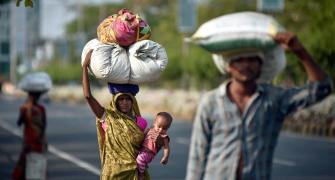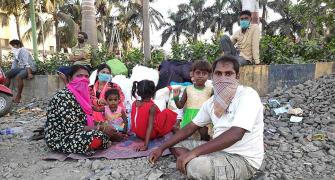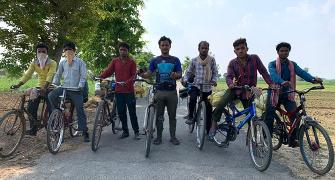'Reports of hitherto 'atmanirbhar' breadwinners having to stand in line for a plastic bag of khichdi or, travelling thousands of kms with nothing but packets of biscuits, have not moved the prime minister,' observes Jyoti Punwani.

Remember the picture of the old jawan weeping outside a bank during the demonetisation crisis? That became the face of the trauma that engulfed the majority of Indians in the last days of 2016 and early 2017, when 86% of our currency in the form of 500 and 1000 rupee notes was demonetised.
Today's lockdown has many faces: A grown man weeping as he holds a phone; workers tumbling out of a cement mixer... all of men and women who build our cities.
Narendra Damodardas Modi was voted in as PM with a sweeping majority on May 16, 2014. In the six years that he has ruled India, this is the second exodus of workers from cities, driven by hunger, joblessness and panic -- all because of one government decision.
This is also the second time the poor are losing their lives as a direct result of this government's policies.

Demonetisation killed 150 Indians. The coronavirus lockdown -- not the virus itself -- has so far killed 119 Indians.
Demonetisation was accompanied by stringent restrictions and constantly changing directives on the exchange of invalid currency for new. Consequently, small businesses that depended on cash transactions were forced to wind up, and workers started leaving cities.
Demonetisation also hit farmers hard. With all their dealings in cash, the absence of banks and ATMs in rural areas meant they were left scrambling to get rid of their old notes, with no means of getting new currency.
The only sections to emerge unscathed from the move were those with more than one bank account and debit card, and those already used to cashless transactions, ie a small upper class minority.

The distress caused by demonetisation was widespread, long-lasting and widely covered by the media. One would have thought this would have been a learning experience for the government on what to avoid next time an earth-shaking decision had to be taken.
Yet, less than three-and-a-half years later, nothing's changed, be it the way the decision was announced, the manner of its implementation or the way the situation is being milked.
And yet again, those suffering are the vast majority of the poor.

Announcement
The nationwide lockdown to contain the coronavirus pandemic was announced with the same suddenness as was demonetisation.
That announcement was made at 8 pm on November 8, 2016, to come into effect at midnight, ie, a four-hour deadline for people to deal with the fact that their life's earnings had become worthless.
The lockdown was announced at 8 pm on March 24, 2020, to become effective at midnight.
Millions of working people had four hours to prepare for the stoppage of all economic activity.

Preparedness
The level of government preparedness was as non-existent now as it was then.
At that time, not enough new currency had been printed; the new 2000 rupee note didn't fit into the ATM slot; banks, already on a VRS spree, were suddenly overwhelmed with desperate hordes trying to deposit their old notes; it was the eve of the rabi sowing season...
This time too, the PM announced the nationwide lockdown without any assurances to daily wage earners who, everyone knew, would be the worst affected. No ordinance was passed banning rent recovery and evictions (New Zealand did this; the UK banned all attachment of property to recover loans).
Nor was it made an offence to stop salaries and lay off workers.
Even a simple welfare measure which required no legislation, such as providing free ration to all, was not implemented.

It has still not been implemented. Reports of hitherto 'atmanirbhar' breadwinners having to stand in line for a plastic bag of khichdi or, travelling thousands of kms with nothing but packets of biscuits, have moved neither the prime minister nor the food and public distribution minister.
The lockdown was necessary to contain the pandemic. But even the basic measures necessary to equip health workers fighting the pandemic were not taken.
Exports of masks and gloves continued right until March 19.
The chairman of the Preventive Wear Manufacturers Association of India complained that despite their requests, right till the lockdown, the government gave no clear picture of the number of PPEs needed, nor their specifications.
Most PPE manufacturers are small scale; the lockdown affected their capacity to produce enough to meet the demand. Why weren't they informed in advance?
Implementation

The way the lockdown was implemented was again reminiscent of demonetisation.
Then, it was left to banks and the police. Neither showed much sensitivity in dealing with people desperate for their own money.
In one case, a mother wanting cash for her son's cancer treatment was paid Rs 2,000 in one-rupee coins. Her pleas that the hospital wouldn't accept them elicited a 'take it or leave it' response. The bag of coins was so heavy that she had to call her cancer-afflicted son to help her carry it home.
Now, implementation of the lockdown has, with the exception of a few states, been left to the police, who by and large have been going about it the only way they know: Through brute force,/strong>. Two persons have so far been killed by police lathis; two by the fear of their lathis.

The twist at the end
There is a fourth parallel.
Demonetisation was initially sold to us as an attempt to nab black money. Later, the PM started extolling its virtues as a means to achieve a cashless economy.
The first goal was effectively used by Modi to convince the poor that all the difficulties they were facing were necessary to make the rich suffer.
The second aim in fact targeted the informal economy and was meant to strengthen the formal sector; a calculated plan for ensuring the survival of the fittest. This was done with the full knowledge that the informal economy accounts for 83% of the workforce.
This lockdown too, has seen a sudden twist in the last week.
Since the lockdown began, workers, rendered jobless overnight, have been running away from cities, which are no longer seen by them as havens of opportunity. Some have said they won't return, they'll make do with whatever little they have in their villages.
This natural reaction by the workers is now being taken advantage of.

The first to welcome these workers back was UP Chief Minister Yogi Adityanath. Boasted one worker walking to UP: 'Why should we come back to Mumbai? Yogiji is going to give us jobs.'
Little did he know what 'Yogiji' had in mind.
Salivating at the prospect of replacing China and Vietnam as investment destinations by providing cheap labour, the Yogi government quickly changed labour laws to make sure workers remain cogs in manufacturing hubs, with no labour rights.
He was promptly followed by seven other states.
At the other end, was the unconcealed glee of a senior Sena minister in Maharashtra at the migrant exodus from his state. Here was an opportunity for 'sons of the soil' to replace them. Remember, this was the party's original mission.
The Centre on its part, using the excuse of reviving the economy, has declared a sweeping privatisation of sensitive sectors such as defence and power.
Amid all this, do the workers's own aspirations matter?
Not to the states, and not to the prime minister for sure.
Through the demonetisation crisis, the prime minister repeatedly acknowledged the difficulties faced by the poor, but persuaded them to put up with these so that the corrupt rich could finally be deprived of their ill-gotten wealth.

And they did just that. Despite their unprecedented suffering, despite knowing that no crorepati had queued up outside banks like they had, they voted overwhelmingly for Modi in the elections that followed, specially in the all-important UP assembly election.
This time, the suffering is even more widespread.
All workers are affected, not just those in the informal sector. Images of migrant workers headed home on foot or packed in container trucks; run over by goods trains and speeding trucks on highways or falling dead out of exhaustion, have been a motif of India's lockdown.
None of this is out of choice.
Yet, the PM chose to describe all this as the 'tyaag and tapasya' of the poor, which have helped India face the pandemic better than richer nations.
Will these workers and their families also convince themselves that their needless suffering was their tyaag and tapasya for the nation?
Production: Aslam Hunani/Rediff.com









